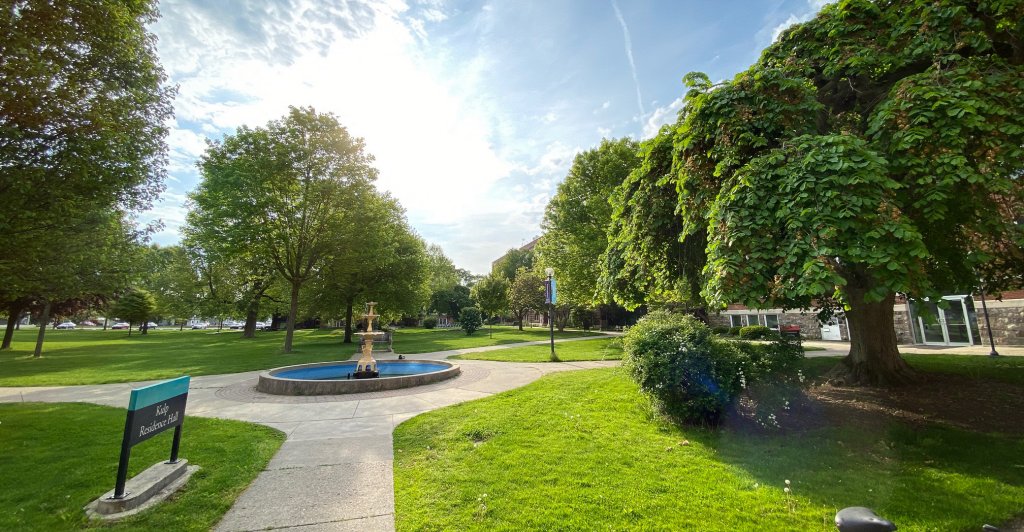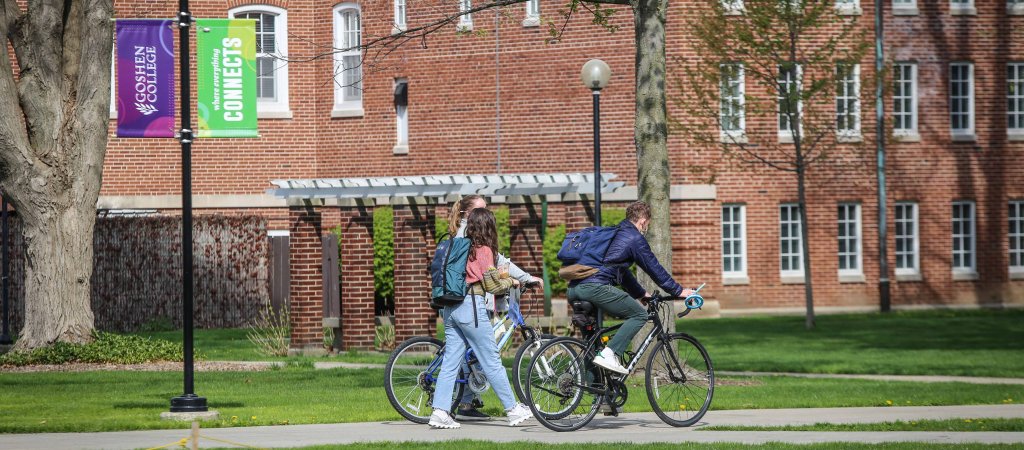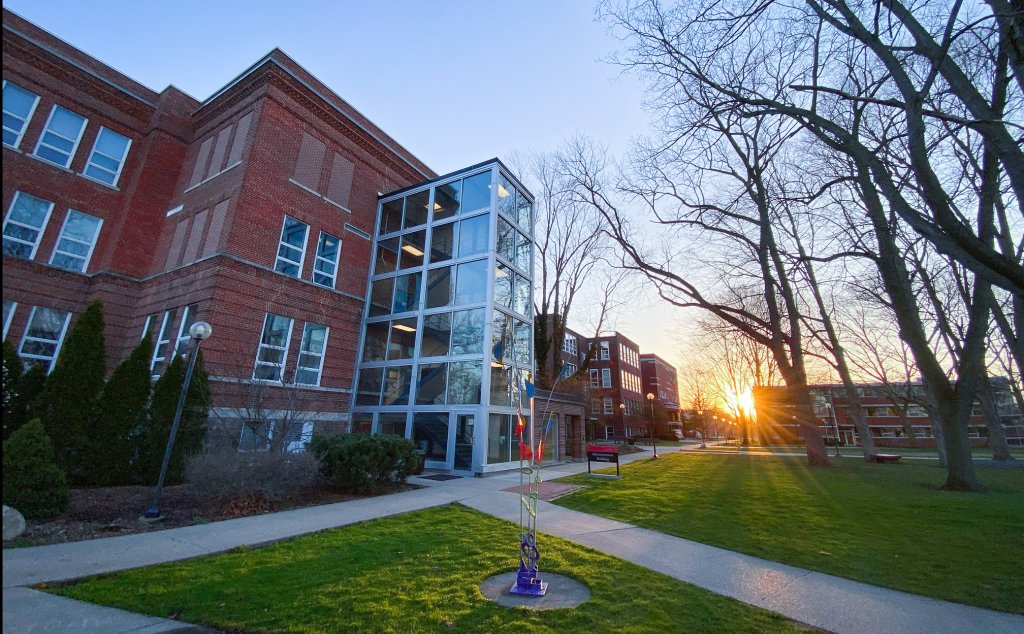Gifts of Property and Retained Life Estate

Do you own property that has appreciated? If you own a house or other personal residence, farm, commercial buildings, income-producing or non-income-producing land that has long-term appreciation and you would incur a significant capital gains tax upon selling it, you might consider the benefits of donating that property to Goshen College. While gifts of cash and appreciated assets like stocks, bonds and mutual funds are quite common, we find that many who desire to make a gift often fail to realize the benefits of a gift of real estate.
These benefits include:
- Avoidance of potential capital gains tax that might occur from a sale;
- Availability of an income tax deduction for the full fair market value of the property;
- Elimination of property tax burdens and maintenance costs; and
- Avoidance of other expenses that would be incurred upon the sale of real estate.
If you are looking to make a gift with real estate, you have a number of charitable giving options. These options include an outright donation, bequest and a retained life estate. Each of these options results in charitable tax deductions and an avoidance of capital gains tax or estate tax. For the purpose of this newsletter, we are going to focus on the simplest and most common gifts of real estate.
In addition, when we mention gifts of real estate to Goshen College, such gifts have normally come to Goshen through Everence Foundation (formerly Mennonite Foundation). For decades, Goshen College has partnered with Everence Foundation to handle non-cash gifts such as real estate. Everence representatives have the knowledge and expertise to deal with such gifts and have greatly assisted Goshen College staff over the years. If you know an Everence Foundation representative, he/she could help you think about the benefits of gifting non-cash assets that will ultimately benefit Goshen College.

An Outright Gift of Real Estate
If you are focused on making a gift of a specific value and have appreciated real estate (family home, family land, vacation home, rental/income property, etc.) that you no longer wish to own, then you might consider deeding the property to Goshen College as an outright gift.
To determine the value of your gift of real estate, you must seek a qualified appraisal no more than 60 days before your donation is made. The Internal Revenue Service form 8283 must be attached to your tax return and the appraiser must sign that he or she is unrelated to you and meets all requirements for qualified appraisers. Goshen College must acknowledge the receipt of the property on the 8283 form when the donation exceeds $5,000. Goshen College will work with your professional advisor to explore any costs associated with donated property. If your property could have contingent liabilities, such as environmental cleanup costs, you must warrant that the property is free from such liabilities and agree to pay such costs if they arise in the future. In some cases, it may be appropriate to incur investigative costs (such as surveys for environmental contamination).
It is very important to seek advice from an attorney, CPA, or financial advisor before considering a gift of real estate. It is possible with a large gift of appreciated real estate that your full tax deduction cannot be completely taken during the year the gift is made. You should consult with your advisors to project your income and determine whether your gift might exceed the annual deduction limit. If so, your excess may be carried over for five years after the gift is made. The length of property ownership, or the holding period, determines tax treatment under the Internal Revenue Code. Your tax treatment of real property gifts will differ depending upon whether your property is considered a long-term or short-term capital asset.

Long-Term Capital Asset Property Gift Example:
The Smiths, who have an adjusted gross income of $100,000, bought a rental property 20 years ago for $120,000 and have seen it appreciate to a current value of $400,000. Their mortgage is paid off and their children have no interest in the property. They considered selling it and giving the proceeds to charity.
However, when they contacted their financial advisor, they learned that giving the property to Goshen College would allow them to take a full, fair market value tax deduction while eliminating the substantial capital gains tax they would incur if they sold the property first and then donated the proceeds.
Since they can deduct 30% of their adjusted gross income (AGI) and carry over the deductions for five more years, the Smiths ultimately found that they were able to make a bigger gift than they would have through more conventional methods.
Bequests
A bequest of real estate differs from an outright donation in that it is not immediate but occurs through your will where an organization is identified as a beneficiary upon your passing. In the case of a bequest of a specific piece of real property, you will want to make the organization aware of your intent to leave the property as Goshen College may find a need to immediately evaluate it to determine whether it can ultimately accept the gift of the real estate. Tax deductions apply and this bequest, if accepted, would be deductible for estate tax purposes.
Your bequest can be specific, naming a specific piece of real property for Goshen College, or it can be contingent or residual and only become available to the organization after other bequests are satisfied.

Residual Bequest Example:
Tammy Anderson created a residual bequest through her will that designates her family farm to an organization as long as all other debts, expenses, taxes and other bequests from the estate have been paid. Upon her death, Mrs. Anderson’s estate will likely cover all debts, expenses, taxes and other bequests, and therefore, the farm will be donated in its entirety to Goshen College. This gift may lessen her estate tax burden.
Retained Life Estates
Did you know that you can deed your home, farm, or vacation house and save taxes with a current deduction while still using the property for the rest of your life? An attractive option for donating real estate to an organization is the retained life estate. This arrangement allows you to give your home to Goshen College while retaining the right to live there for the rest of your life.
Retained life estates are excellent giving vehicles if:
- You wish to make a gift of a personal residence to Goshen, but don’t want to move out.
- You would consider deeding your home, cabin, or farm to Goshen College if you can continue to live there rent-free.
- Your home is not subject to mortgage or other obligations.
- You do not wish for family members or others to take on the obligation of selling your home.
- You do not need the proceeds of the sale of your home.
- You are seeking to reduce estate taxes.
This is an ideal planning vehicle if you wish to make a testamentary gift of real property to Goshen College yet enjoy a current and potentially substantial charitable income tax deduction. Were you to create such an agreement, you will have the legal right to live in your home during your life. You would receive a charitable deduction based on the fair market value of your home minus the present value of the life tenancy you have retained. Additionally, any capital improvements you make may give rise to additional deductions.
With a retained life estate, you are able to make a significant gift to Goshen College without decreasing your income or your living arrangements. You will continue to be responsible for its taxes, structural maintenance, insurance and upkeep during your life.
With respect to gifts of a remainder interest in a personal residence or farm, you would be entitled to a charitable contribution income tax deduction in an amount equal to the net present value of the charitable remainder interest. The calculation is performed under the guidelines described in Reg. §1.170A-12 and is based on the:
- fair market value of the property (including improvements) on the date of transfer;
- fair market value of depreciable improvements attached to or depleting resources associated with the property on the date of transfer;
- estimated useful life of the depreciable improvements;
- salvage value of the depreciable improvements at the conclusion of their useful life;
- measuring term of the agreement (if measured by the life of one or more individuals, the date of birth of the individuals); and
- Applicable Charitable Midterm Federal Rate (in effect for the month of transfer or during either of the two preceding months)
The Applicable Charitable Midterm Federal Rate for February is 0.6%, a near historic low. The lower the CMFR, the higher the income tax deduction. With a record-breaking year in 2020 for the housing market, retained life estates may be a sound option for some this year.

Retained Life Estate (Two Life) Example:
Mr. and Mrs. Smith, ages 80 and 73, wanted to make a special gift to Goshen College and transferred a remainder interest in their residence to Goshen in April 2021. The agreement will be measured by Mr. and Mrs. Smith’s lives. On the date of transfer the property has a fair market value of $300,000. The depreciable portion of the property has been estimated at $150,000 and has an estimated useful life of 45 years. The Applicable Charitable Midterm Federal Rate for April 2021 was 0.89%. It is determined that the income tax deduction at the time of the Smith’s gift was $224,338 and they retain the ability to live in their home.
Whether it is through an outright gift, a bequest, or a retained life estate, gifts of real estate can provide you with another creative way to solve taxable and other issues while making a generous gift that will allow Goshen College to better realize its mission. Feel free to contact us to learn more about how we would work with you to evaluate whether your home, farm, vacation house, or other real estate might be a smart option to help you fulfill your charitable intent. You can find us at www.Goshen.edu/Give/contact/ You may also visit our website at www.Goshen.edu/give for more information. We are here to help you in any way we can.





